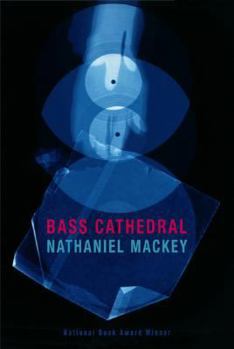Bass Cathedral
(Book #4 in the From a Broken Bottle Traces of Perfume Still Emanate Series)
Los Angeles, October 1982: Molimo m'Atet, formerly known as the The Mystic Horn Society, is preparing to release its new album Orphic Bend. The members of the jazz ensemble--Aunt Nancy, Djamilaa, Drennette, Lambert, N., and Penguin--are witness to a strange occurrence: while listening to their test pressing, the moment Aunt Nancy's bass solo begins a balloon emerges from the vinyl, bearing a mysterious message: I dreamt you were gone.... Through letters N. writes to a figure called Angel of Dust, the ever-mutating story unfolds, leaving no musician or listener untouched.Bass Cathedral is Mackey's fourth volume in his ongoing novel with no beginning or end, From a Broken Bottle Traces of Perfume Still Emanate. Thought balloons morph into mute-stereoptic emanations; N. encounters a master mouthpiece-maker; Drennette leaves Penguin dateless; Lambert's kicking it around with Melanie--much is abuzz but something else is happening to the ensemble. The music seems to be living them. N. suffers cowrie shell attacks and they are all stranded on an Orphic Shore. Socio-political forces are at play or has this always been the essence and accident of the music's resilience? And Hotel Didjeridoo must be resurrected, but how? Myth spins music spins thought spins sex--Mackey's post-bop boxless box set is, as the Utne Reader wrote, "Avant-garde literature you can love: an evolving multivolume novel of the jazz world that plays with language and ideas the way Thelonious Monk plays with flatted fifths."
Format:Paperback
Language:English
ISBN:0811217205
ISBN13:9780811217200
Release Date:January 2008
Publisher:New Directions Publishing Corporation
Length:224 Pages
Weight:0.55 lbs.
Dimensions:0.6" x 5.3" x 8.0"
Customer Reviews
2 ratings
When Paragraphs Come Out Sounding Right...
Published by Thriftbooks.com User , 16 years ago
Albert Murray, American man of letters, novelist and all-purpose literary intellectual, said "to me, you can write more poetry in prose than if you restrict yourself to certain verse forms." A staunch modernist who came of age in the 1930s, Murray's literary models were Eliot, Pound, Faulkner, Kafka and Mann. He said "but at the same time that I'm reading these guys, I'm also listening to Louis (Armstrong) and Duke (Ellington) and Kansas City jazz and coming to terms with that too....so it's all part of the same thing with me. When a sentence sounds right to me, it's probably some variation of the Kansas City 4/4, and when it has the right rhythm, it's getting close to what Hemingway and others did." Nathaniel Mackey's epistolary novel Bass Cathedral is rooted in the same 20th century elements, albeit with perhaps Miles Davis, Ornette Coleman and Pan African worldmusic as additional musical influences. Mackey revisits and extends Murray's mental map, attempting to build the novel on a structure of sound and language that is inevitably postmodern--highly metaphoric and rhythmic with the feel of a poetry slam--a performance that is not simply writing about jazz, but writing that is jazz. Poetry is the language of suggestion, not the language of meaning. Mackey's love of words, their sound and their suggested intersection with the airy vibrations of music would certainly make sense to a jazz cat like Albert Murray or anybody else who can see with their ear's eye.
Good read; better on the second go 'round
Published by Thriftbooks.com User , 16 years ago
Read it once, read it twice. You'll like it. Challenges the form of the novel; or is it even a novel?






